Athletic attendance dwindles over past decade
BY ALLISON CAMPBELL & JACOB UNRUH editor@thesunflower.com & sports@thesunflower.com
The median attendance at Wichita State University athletic events has decreased by half over the past decade, according to data collected by The Sunflower.
Total home attendance in athletic events where it is tracked — men’s and women’s basketball, volleyball, softball and baseball — was 315,828 during the 2014-15 school year.
It was 181,055 in 2023-24 — 53% of the total attendance from a decade earlier — and is on track to decline further this year.
“It’s very frustrating,” said Sheryl Davis, basketball season ticket holder and longtime Shocker athletics fan. “... Right now there’s no demand (for fans to attend games).”
The decrease has been nearly uniform across all sports, except for softball. Median attendance at men’s and women’s basketball, volleyball and baseball in 2024 were all around half of what they were in 2014. Softball’s median game attendance increased from 284 in 2016 to 816 in 2024, a nearly three times increase. According to NCAA records, overall Division I attendance has increased in some sports and remained similar in others over that timespan, which makes Wichita State an outlier.
ATTENDANCE DECREASES LONG BEFORE COVID
According to attendance records, the decrease in fan engagement began long before the COVID-19 pandemic. Since 2014, Wichita State has had at least three directors for marketing and fan engagement.
Reginald McIntyre Jr. first served as the assistant and then in a director capacity from 2016 until 2021. He said in an interview in 2019 that the departure of basketball stars Ron Baker and Fred VanVleet left game attendance “kind of iffy.”
In November 2016, Wichita State men’s basketball broke a long streak of sold-out stadiums. Four home games that year were played in front of less-than-full crowds.
McIntyre asserted, though, that people then began coming back “in waves,” despite attendance averages remaining static.
But McIntyre also acknowledged that the student section remained more empty than he wanted.
Associate Athletic Director for Strategic

Communications Tami Cutler credits some of the difficulties to the program switching from the Missouri Valley Conference to the American Athletic Conference in 2017. The Valley plays most conference games on Fridays and Saturday nights, while the AAC plays on Sundays.
“We’re competing with other things, church and … (the Kansas City) Chiefs and other things,” Cutler said. “And so … the Sunday matches … kind of turned into, well, … it doesn’t matter who we’re playing because … people already have activities planned for that day.”
By 2020, attendance continued to drop in most sports, in some by the hundreds. Marketing directors were then confronted with a new attendance challenge — the COVID-19 pandemic.
PARTICIPATION AND THE PANDEMIC
With the pandemic came the cancellation of athletic events across the country, depriving fans and athletes of the typical sports seasons. Current Director of Marketing and Fan Engagement Connor Phelps said this created a new epidemic — a population of armchair fans.
“(During COVID) people … weren’t allowed to come to the games, and so they had all this free time, this additional … kind of discretionary income to spend elsewhere,” Phelps said. “You know, they realized that they liked using it maybe elsewhere ... So it’s been kind of hard to get some of those fans back.”
Attendance at WSU was already declining prior to the pandemic. In 2018-19, total attendance was 247,727 – 78% of the total attendance five years prior. However, in 2020-21, attendance tanked to
80,313 and hasn’t recovered to pre-COVID levels since.
Since COVID, Phelps said athletics marketing has had to invest even more in its creative and social media departments to match the needs of fans, who became accustomed to short-form video content throughout the pandemic.
“We’ve added a lot of content creators to our team to just kind of cover a lot of the day-to-day stuff … we maybe weren’t hitting years and years ago when social media wasn’t as important,” Phelps said.
ADDRESSING ATTENDANCE DIFFICULTIES
Despite the additional content creators, attendance has continued to dip, except for softball. Phelps said multiple factors impact game attendance, ranging from ticket prices to concession offerings, promotional events and team performance.
What’s
going on in Lindquist 601?
BY KASS LEWIS lewkass05@gmail.com
On Jan. 29, the Wichita State English Department’s Instagram page posted a cryptic photo of a gutted room with the caption, “We’ve got something amazing cooking in English 601! What do you think it is? Wrong answers only!” The comments followed along with the “Wrong answers only!” instructions, with one comment from @danarndtwrite saying,“Live-in grad student viewing enclosure and pellet station?” This post still begged the question: What is going on in Lindquist 601?
“We were hoping some of our students would find that interesting and start asking questions,” Katie Lanning, an assistant professor of English at Wichita State, said of the post. Lanning said the English department is building a book technologies lab.
“It’s going to be like a space to study the history, and the present, and the future of how books get made,” Lanning said.
The Robert L. Cattoi Book Technologies Lab will include many different tools and machines, both vintage and contemporary, to create books, zines and other printed materials.
The second Instagram post listed the various services provided in the book technologies lab: bookbinding, letterpress, 3D printing, book digitizing, zine making, digital publishing, making a book, digitizing a manuscript and printing a text by hand.
Francis Connor, an associate professor and chair of the department, explained that digitizing a manuscript would allow students to create digital versions of written text in a much better quality than a photocopy.
“It’s also going to be an optical scanner. So what it can essentially do is take the text on the book and create a word file with that text, so that you can put that in a word processor. And that’s what you can use to create your book manuscript,” Connor said.
The space would also allow students to publish their very own pieces of written media, something Connor said is not always easily accessible.
“The traditional avenues to being a publisher have really kind of exploded,” Connor said. “There are only a handful of major ones left.”
The space will also act as a classroom. English students will have the opportunity to learn the histories behind the book-making process while being able to do the process themselves.
“We’re hoping it can be a space to have, like, events and community workshops and host classes in there,” Lanning said. The lab, however, is not exclusive to English students.
“We’re hoping eventually it will be (open to everyone) once it’s underway, and we can see what staffing is like,” Lanning said. “... For now we’re thinking more of having particular open hours where folks can come in and we can help them with the process and do workshops.”
WSU already has one printing press, located in the McKnight Arts Center.
“We’re hoping to do a lot of collaborative projects and events with that space,” Lanning said.
Construction on the book technologies lab is planned to be completed this month or early March, and a soft launch is planned for the fall.

ICE agents now allowed on college campuses; what resources do students have?
BY SOPHIA BEST sophiadapbest@gmail.com
Students in the Shocker Success Center may have noticed red papers placed throughout the building. In both Spanish and English, the papers outline how people can respond in the event a U.S. Immigration and Customs Enforcement agent coming to their home or approaching them in public places, including on campus.
ICE agents, previously banned from making arrests on higher education campuses, are now allowed to operate within these spaces.
This change has left many immigrants and international students feeling nervous. Lucas Blasetti, an international studies major from Argentina, said he’s feeling the uncertainty.
“It makes me feel uncomfortable. Even though I haven’t heard that they have been hanging around Wichita State yet,” Blasetti said. “I can feel a little pressure that I could be detained at any moment to ask about my immigration status … if the moment comes, even if I answer what they ask me and show my legal status, I will always be left with the feeling that I could be detained.”
Despite these changes, students have resources — and rights.
Eiran Saucedo-Rodarte, the assistant director of first year programs and president of the Latine Faculty and Staff Association (LFSA), said there are many resources available to people worried about immigration-related issues.
Saucedo-Rodarte suggested the Kansas Immigration Coalition, a statewide collection of organizations dedicated to helping immigrant communities access resources.
For students from Mexico, the ConsoleApp gives immigrants access to information on the location of consular care offices and legal rights.
The National Immigration
MISSION
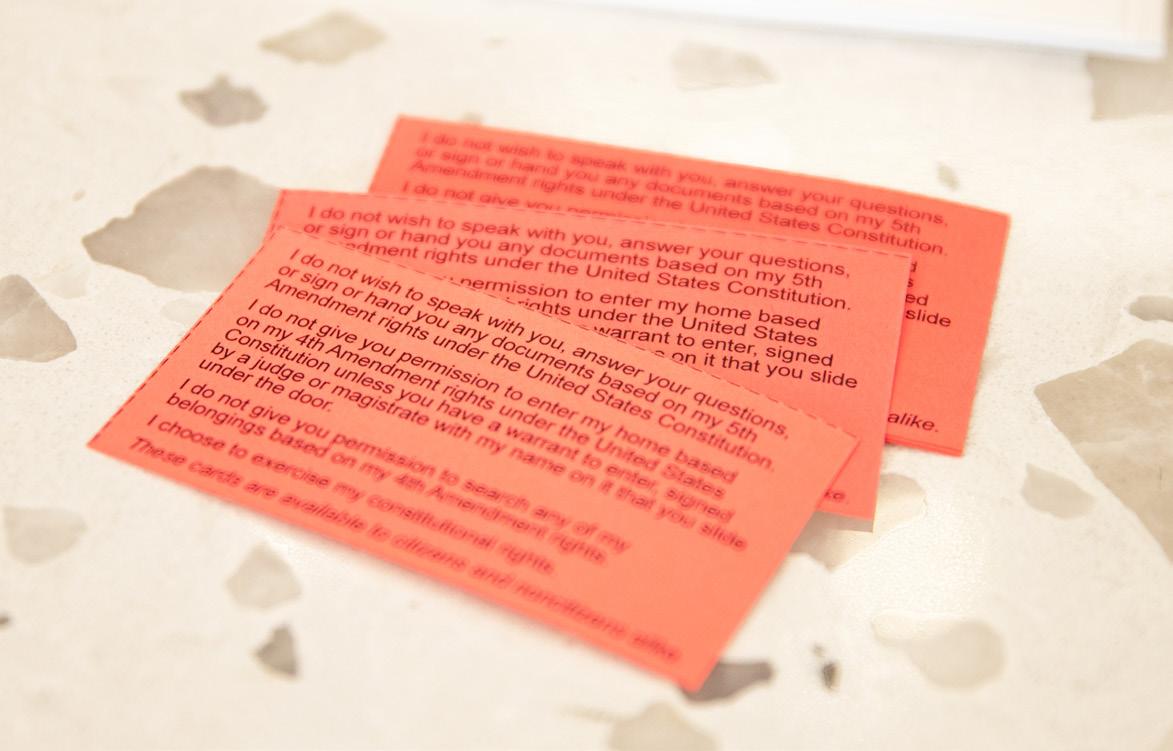
Law Center has also released a set of guidelines for helping immigrant students and employees in higher education. They include information on FERPA (Family Educational Rights and Privacy Act) protections and providing mental health support.
While there are many offcampus resources, WSU groups and organizations are still in the process of creating support for students. The university does have an official page dedicated to resources for undocumented students.
“I would be transparent in that we (LFSA) don’t have many resources for DACA students, faculty or staff on our campus,” Saucedo-Rodarte said. “We are being proactive in trying to build those resources. We are at a historically white institution which wasn’t built to have all of the resources and services.”
Students are also feeling the lack of official resources offered by WSU.
“I do not feel that they have offered any kind of support. I have seen more action from the Student Government,” Blasetti said.
The Student Government Association’s Student Senate recently called for the university to help students, faculty and staff know their rights and to prevent immigration enforcement from
The Sunflower — both in print and online — will be a timely resource of information about the Wichita State University community. It will report on news, issues, activities, academics and athletics, in addition to offering a forum for discussion, reviews and commentary. It will also be an effective learning experience for students, who will have the final authority over what is published.
The Sunflower is a member of the Associated Collegiate Press, College Media Association and the Wichita Journalism Collaborative.
LEGAL
One free copy of The Sunflower is available to members of the WSU community. Additional copies may be obtained from the newsroom, Elliott Hall 019. The Sunflower is private property and unlawful removal or use of papers is prosecutable. The Sunflower is funded by a combination of print and online advertisement sales and student fees allocated by the Student Government Association.
Copyright © 2025 The Sunflower. This newspaper, its design, photos and all contents are copyrighted.
operating on campus when possible. The resolution — a request for the university to take action on a subject — calls for more information regarding the rights of students, staff and faculty as well as that WSU comply “as little as possible” with immigration enforcement.
Student Body President Kylee Hower said at Wednesday night’s Senate meeting that although she has not signed the legislation, she plans to. If Hower signs it, the resolution will be sent to university administration.
Saucedo-Rodarte said his organization is also working on similar goals.
“I can only speak for LSFA,” Saucedo-Rodarte said. “In my perspective, the administration isn’t going to stop or hinder any kind of initiatives that our group is advocating for … building our community, and ensuring that those faculty and staff members feel like they have a place and home here at WSU.”
Amid the uncertainty of policy changes, students like Blasetti are still living, working and learning at WSU.
“At the moment, I know that international students will be able to complete their goals despite the environment, but I also know that politics are volatile,” Blasetti said. “I do not know if I would respond the same in a few weeks or months.”
ATTENDANCE FROM PAGE 1
“I mean, it’s hard to point to one reason, to be honest, right?” Phelps asked. “I mean, you have the COVID factors, you have economic factors, just so many different things that it’s really hard to pinpoint, like, one reason as to why … this is decreasing, or it’s less than it used to be. So it’s really hard to tell.”
But for some long-time Shocker athletics fans, like Davis, the stagnation in attendance has become increasingly frustrating.
When Davis was a student at Wichita State in the late 1960s, she said Charles Koch Arena was the epicenter of excitement on campus.
“It was standing room only,” Davis said. “It was the place to be.”
But, nearly 60 years later, Davis said the landscape looks considerably more empty than when she was a student.
Dissatisfied with what she’s seen and experienced in recent years, Davis called for fan input on The Shocker Faithful, a Facebook group for students, fans and alumni of Wichita State. Her two posts garnered more than 100 responses, which she said overwhelmingly pointed to two key indicators for the drop in attendance: high prices and poor parking.
“When we can’t go, we give our tickets away,” Davis said. “I put them on (The Shocker Faithful) and say, ‘Here,’ and there are people who love to go.
“They just can’t afford it.”
Phelps said ticketing is generally “cheaper than … a lot of the high school events around town,” but there is an emphasis placed on deals regarding season ticket holders.
“We want to respect the investment that season ticket holders … make to us when they purchase these season tickets at the beginning of the year,” Phelps said. “... If we price 16 games at $5 a ticket … it’s really doing more harm than good in the long term for us because you then have those season ticket holders who can become kind of less committal.”
But Davis feels that her survey — and WSU athletics — don’t reach the root of the recent attendance slump: disengaged students.
“They’re already coming or not — They’ve made up their minds,” Davis said. “ … (But) when you look at your (target) market, it’s not me … (it’s) those students who … have a longer-term relationship with the university.”
Phelps said athletics has been working to entice students, especially commuters, to come to games through tailgates, giveaways and free food.
WSU athletic faculty want to hear directly from students as to what might encourage them to attend athletic events. After all, Cutler said, everyone wants better attendance.
“We also want … a packed house, and we’re doing everything we can to … get people there and get the butts in seats,” Cutler said. “It’s great for everybody, not just … them. It’s great for the players, too. And … everybody loves it when (it’s) super loud in there.”

EDITOR-IN-CHIEF Allison Campbell editor@thesunflower.com
MANAGING EDITOR Mia Hennen managing@thesunflower.com
NEWS EDITOR Ainsley Smyth news@thesunflower.com
ARTS & CULTURE EDITOR Maleah Evans arts@thesunflower.com
SPORTS EDITOR Jacob Unruh sports@thesunflower.com
ASSISTANT SPORTS EDITOR Owen Prothro owenprothro@gmail.com
OPINION EDITOR Piper Pinnetti opinion@thesunflower.com
PHOTO EDITOR Garima Thapa photo@thesunflower.com
PODCAST PRODUCER Taliyah Winn podcast@thesunflower.com
ADVERTISING MANAGER Kiona Brown admanager@thesunflower.com
COLLECTING FEEDBACK
To increase attendance, Director of Marketing and Fan Engagement Connor Phelps works with Director of Athletics Kevin Saal to conduct fan experience surveys at the end of every athletic season to “get our finger on the pulse of what our fans want to see.”
“We’ve gotten literally close to 1,000 responses in each offseason in doing that,” Phelps said.
The athletics department also hosts regular listening sessions. According to Associate Athletic Director for Strategic Communications Tami Cutler, these sessions invite different age groups to discover what will bring more fans to WSU athletic events. Suggestions range from accessibility concerns to halftime performance recommendations. Then, Phelps and Saal get to work implementing the feedback, often starting with what the two like to call “the low-hanging fruit.”
“Hit the easy ones first, and just kind of keep that momentum going,” Phelps said. “... If they tell us they want to see a DJ or … an emcee or the band to play more like whatever it is, we want to make sure that we’re giving them the experience that they want.”
But the process isn’t without its struggles — Phelps says conflicting opinions from different demographics make applying these changes “hard to balance.”
“You’ll have one group that says, ‘Yeah, the music is way too loud.’
Another group, ‘The music isn’t loud enough,’” Phelps said. “I mean, obviously neither of those you’re really knocking off the list.”
But Phelps said the majority of concerns presented during these listening sessions are addressed, and the feedback has been positive over the last few years.
“It’s been pretty cool to see the progress through the feedback of our fans, like I think they notice … improvements in a lot of areas,” Phelps said. “And so I do think, like that, the number of critiques is kind of starting to be dwindled down.
“Like it doesn’t seem the first year, when I got here, it was like, ‘Holy crap. This whole list here is, like, what we’re about to tackle,’ and now it’s a little more manageable, for sure.”
The goal, Phelps said, is to build an experience worth coming back for.
“Yes, there’s a basketball game going on, and that’s the primary draw,” Phelps said. “But there’s also a lot of these other happenings that … we hope fans look at and be like, ‘Oh, that’s definitely worth, you know, making the trip out there for.’”
Despite these listening sessions, Sheryl Davis, a Wichita State alumna and season ticket holder, said she feels unheard.
“We have an athletic department who sits in their offices and decides ... they won’t listen to anybody,” Davis said. “... I don’t know how to reach the athletic department because I’m not the only one who harasses them. There are a lot of us who say, ‘No, this is not the way you do it.’”
CONTACT US 019 Elliott Hall 1845 N. Fairmount Ave. Campus Box 134 Wichita, KS 67260-0134
EDITORIAL Allison Campbell: 316-978-6906
editor@thesunflower.com
ADVERTISING Kiona Brown: 316-978-6905 admanager@thesunflower.com
FACULTY ADVISER Amy DeVault: 316-978-6052 amy.devault@wichita.edu

‘DISREGARD FOR ANIMAL WELFARE’ Documents detail how WSU biology researcher violated lab animal protocol
BY AINSLEY SMYTH news@thesunflower.com
In April 2024, Shang-You Yang, an adjunct associate professor in Wichita State’s biology department, was supervising a cancer research project. By the end of the month, the project was suspended due to violations of lab animal use protocols.
A preliminary report that the university submitted to the federal Office of Laboratory Animal Welfare after the incident details what happened.
The Sunflower obtained a copy of the report from Stop Animal Exploitation NOW!, as well as the final report and other relevant communication between employees at Wichita State and OLAW. They detail the events of the project, the four protocols that were violated and the corrective actions to be taken by Yang.
Stop Animal Exploitation NOW! opposes all research using animals. They obtained the records through a Freedom of Information Act request.
In addition to his role at WSU, Yang is a research professor of orthopedic surgery at the University of Kansas Medical Center and a senior research scientist at Via Christi’s Orthopedic Research Institute. In December 2024, the University Daily Kansan reported another KU researcher was found conducting unapproved
Ysurgeries on rats. Yang did not respond to The Sunflower’s attempts to contact him.
WHAT HAPPENED
Yang’s team was researching a topical medication following the removal of breast cancer, “a novel tamoxifen-containing hydrogel,” according to the report. They injected cancer cells into six mice in order to perform surgery to remove the cancer. Then, Yang and his students were supposed to test a topical medication applied after the procedure. But things went wrong.
According to an email from WSU to OLAW’s Division of Compliance Oversight, the “tumors grew bigger than expected.” Shang determined that only three of the mice “would be able to handle the surgery.”
He then performed the surgery on the three remaining mice.
It was revealed in the investigation that the mice, instead of being injected with breast cancer cells in one site, had been injected in two sites, violating the preapproved protocol for the project. But it was not identified whether this is what caused the cancer to grow faster than expected.
The report referred to this as “disregard for animal welfare minimizing pain and distress.” It went on to say, Yang “allowed 3 mice to survive a surgery when they

should have been euthanized.”
According to the July 1 email, Shang also allowed two student research assistants to provide anesthesia and one student to help perform the surgery.
The university’s final report to OLAW said Shang misunderstood the required training, allowing students to participate in capacities for which they had not been trained. The students completed online training modules but were not trained for anesthesia use or surgery, according to the report.
After the surgery, the report said Shang “determined that the 3 mice would not survive long.”
Shang did not euthanize the mice. Instead, they were left unsupervised for the next 17 hours overnight, the report said.
An animal care technician, the report continued, found two of the mice dead and one “cold and almost dead.” The technician then euthanized the final mouse.
THE INVESTIGATION AND RESULTS
When WSU was made aware of the violations, it suspended the project, reported the issue to OLAW and investigated the matter.
Kim Cluff, chair of WSU’s Institutional Animal Care and Use Committee, quoted an email from Yang in his correspondence with OLAW.
According to Cluff’s email, Yang
wrote, “I feel terribly sorry for the unfortunate incident and the violation of IACUC regulations when handling mice.”
“These violations not only impaired animal welfare and wasted resources/time of IACUC members and the administrators,” Yang wrote, “but they also humiliated my reputation as a senior researcher with more than 30-year-experience in animal experiments.”
Yang outlined six corrective actions he would take in future research.
This included paying close attention to correct procedures when using animals, better training of student assistants, not operating on animals that are not fit, allowing a veterinarian and animal care technician to supervise, properly monitoring animals before and after surgery and submitting new protocols if continuing the project.
The project, according to the documents, was privately funded.
According to Lainie Mazzullo-Hart, WSU’s director of communications, the university is “unable” to say where the funding originated.
In the excerpt from his email, Yang wrote that the grant used to support the project would soon expire.
“I will submit an amendment to the IACUC if more fund(s) is secured to continue the breast cancer project,” the email said.
However, Yang ultimately
decided not to continue the project, according to the final report and other emails.
Mazzullo-Hart addressed the case on behalf of WSU.
“During the research, three mice were impacted, and it was determined that, although no federal laws were violated, required protocols and training were not followed,” Mazzullo-Hart wrote in an email.
Mazzullo-Hart said the IACUC immediately reported the issues to OLAW and “took appropriate corrective action.”
According to Mazzullo-Hart, animal research constitutes a very small portion of the research done at WSU.
“On average, a total of 30 animals (mice, rats and hamsters) have been involved in studies at WSU over the past three years,” she said via email.
Michael Budkie, the cofounder and director of Stop Animal Exploitation NOW!, said he contacted university leadership, asking that Yang be prevented from conducting future animal studies.
Budkie said he received no response from the university.
“The staff that were connected to this research project should be permanently banned from animal use and the Wichita State Institutional Animal Care and Use Committee needs to be reconstituted,” Budkie said.

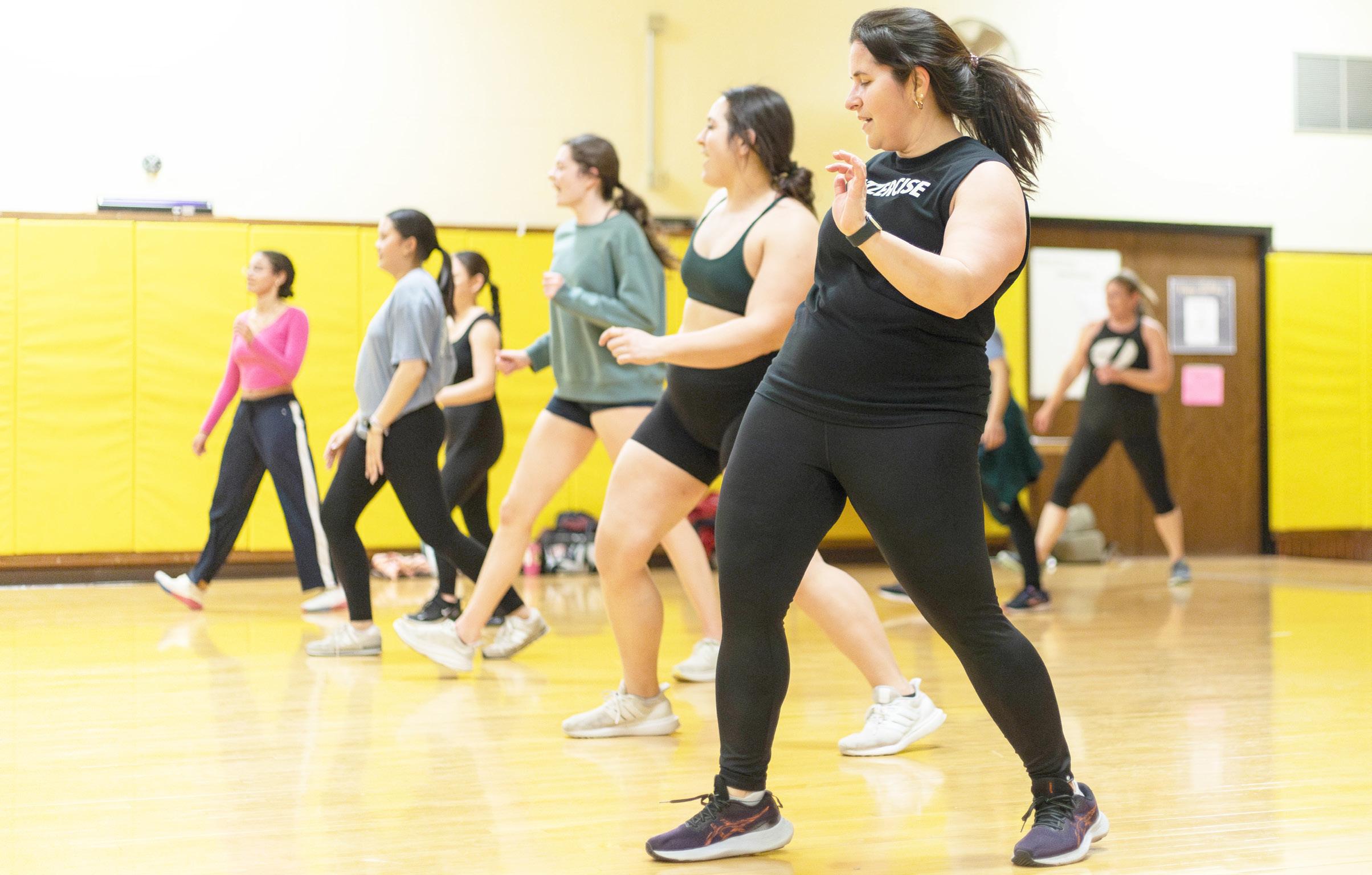
Women in CHAARG: New workout group on campus
BY SOPHIA BEST sophiadapbest@gmail.com
A new women-only workout group has been made official at Wichita State this semester.
Changing Health, Attitudes and Actions to Recreate Girls, CHAARG for short, is an organization dedicated to helping college students work out — and feel comfortable with who they work out with.
Sarah Proberts, the treasurer of the WSU chapter, found that the women’s-only group gave her the space and confidence to find a new exercise style.
“I want girls to be able to go to the gym, and find their confidence that I found,” Proberts said.
CHAARG is present on more than 100 campuses in the U.S. The groups try new workouts together every week — but it isn’t just about exercising, it’s about making connections.
Chloe Fiechtl, president of the chapter, described the group as a way to get involved, make friends and feel positive about your body.
“Put some investment into
yourself,” Fiechtl said. “It’s always worth it in the end, and finding people with the same interests as you … where it’s kind of hard to get involved.”
Currently, the group has workout sessions planned every Tuesday. The most recent event was a free Jazzercise class taught by a local group.
Lauryn Gordon, an event coordinator, came up with the idea for a Jazzercise class after looking at a listicle rating the most enjoyable workouts. She hadn’t seen a Jazzercise event hosted at WSU before.
Gordon joined the group because it offered a similar experience as high school sports: a place to build connections and exercise among other women.
“I wanted to join a group with just girls, like how high school sports are just girls being together,” Gordon said. “I really missed that part of high school, so I wanted to bring it here.”
Smaller groups also form to do everything from more individual workout sessions and lessons to grabbing coffee and chatting.
Softball goes 3-1 in OU Tournament, only loses to No. 2 Oklahoma
BY MACK SMITH
mackred22@gmail.com
Wichita State softball took three of four games at the OU Tournament in Norman, Oklahoma. The Shockers beat Bowling Green State University and Abilene Christian University twice. The Shocker’s only loss came to the hosts, No. 2 University of Oklahoma.
The Shockers have a 9-5 season record and have lost all four games against ranked teams.
SATURDAY
After only scoring 12 runs in the previous weekend, Wichita State hit the ground running in the first matchup against Bowling Green. The Shockers put across 15 runs in a 15-4 run-rule win over the Falcons.
Bowling Green scored in the first inning, but the Shockers piled on the next six runs with the help of three Falcons errors.
Wichita State scored four runs in the third inning by hitting back-to-back-to-back doubles.
Junior second baseman Sami Hood extended the lead to 11 runs with her second home run of the season in the fourth inning.
The Shockers defense committed a season-high five errors. In the circle, freshman Ava Sliger got her first win in her collegiate career, giving up four unearned runs.
SUNDAY
In a repeat of last year’s matchup with the Sooners, three runs from Oklahoma in the first inning helped down the Shockers.
The Sooners beat Wichita State, 8-1.
Oklahoma scored six runs before the Shockers scored their first. The only WSU run came from a graduate student Ellee Eck home run in the fourth. The Shockers struck out a season-high ten times.
The Shockers rebounded in the second half of the doubleheader, beating Abilene Christian, 3-1.
After a slow start with three straight zeros thrown up by both teams, the Wildcats broke through with a solo home run in the fourth inning. The Shockers took the lead on a two-run pinchhit home run from sophomore Sydney Zenon in the fifth.
In the seventh, the Shockers scored an insurance run from a Hood single. Junior pitcher Alex Aguilar earned her fifth win of the season. With the win, head softball coach Kristi Bredbenner won her 400th game as the Shockers’ head coach.
MONDAY
Wichita State beat Abilene Christian for the second straight day, 10-3.
Wichita State got on the board first, as Hood hit an RBI single. The Wildcats tied the game after scoring on an error.
In the third inning, three different WSU batters hit home runs. In the sixth inning, the Shockers put up four runs with the help of three Wildcat errors.
The softball team is traveling home for the first time this season to play in the Shocker Invitational from Thursday, Feb. 27, through Sunday, March 2.
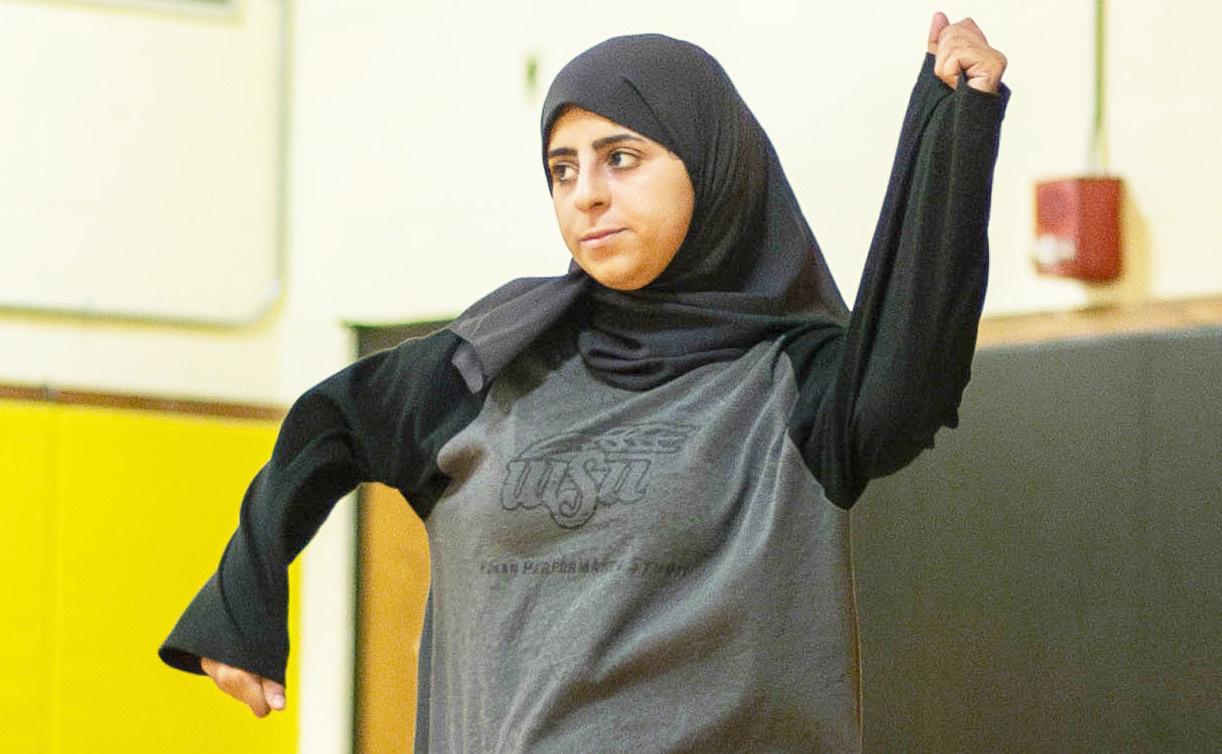
They also host social events. The group’s other event coordinator, Aleah Netherland, helped plan a flower bouquetmaking social that was hosted in February. Students were invited to come in, make a bouquet and learn about the group.
“You don’t have to be experienced at all when you’re doing these workouts,” Netherland said. “Honestly, it’s fun to just hang out with the girls, just come have fun with us.”
Sophia Nguyen, vice president
of the club’s membership, attended the bouquet-making social alongside other members. Nguyen found out about the group through their newly formed Instagram and became interested in bonding with the other members.
“I’ve built such a close bond with the girls on the exec team already,” Nguyen said.
While the official last day to join the group was Sunday, Feb. 9, interested students can still become a part of the group by messaging via Instagram or email.
Baseball loses series at Hawaii, game against DII Chaminade
BY OWEN PROTHRO owenprothro@gmail.com
Wichita State baseball made two firsts during its trip to the Aloha State.
The Shockers ended the University of Hawaii’s thenlongest home winning streak in the nation but dropped three of four games in the series. In its first-ever game against Division II Chaminade University, WSU lost after giving up a grand slam in the first inning.
Wichita State left Hawaii with a 2-6 overall record to start its season.
THURSDAY
Wichita State sent the game into extra innings, but Hawaii pulled out the win in walk-off fashion, 4-3.
In the bottom of the 10th inning, Hawaii won by manufacturing a run off a walk, sacrifice groundout, wild pitch and infield single.
Junior Nick Potter was credited with the loss.
FRIDAY
Wichita State snagged its only win against Hawaii, 11-4, and snapped the ‘Bows 16-game run in Les Murakami Stadium.
Senior Jordan Rogers sent a three-run shot over the left-field wall in the seventh inning.
Sophomore Brady Hamilton earned his first win on the mound this season.
SATURDAY
The Shockers were scoreless
Shocker Sports Roundup: What you
missed over the weekend
BY MACK SMITH mackred22@gmail.com
TRACK AND FIELD
Wichita State secured multiple personal records and podium finishes at the Arkansas Qualifier in Fayetteville, Arkansas, on Friday. On the women’s side, senior Sydney Brown finished seventh in the 200-meter with a time of 24.37. Sophomore Kate Campos had a personal best in the 60-meter hurdles to finish fifth at 8.37 seconds. She now holds the fifth fastest time for the 60-meter in school history and ranks sixth for the event in the AAC.
Sophomore Brianna Utecht had a personal best in the long jump with a distance of 5.81 meters, finishing third.
On the men’s side, sophomore Yared Kidane got second in the 800-meter with a personal-best time of 1:47.21. Sophomore Jason Parrish also had a personal best in the 200-meter and finished eighth overall, securing the ninth-fastest time in school history.
The Shockers will next compete at the American Athletic Conference Indoor Championships in Birmingham, Alabama, from Thursday, Feb. 28, to Saturday, March 1.
WOMEN’S BOWLING
Wichita State couldn’t replicate last week’s feat of beating the top three teams in the nation, but the Shockers were still able to finish as runner-up in the Big Red Invite in Nebraska.
The team finished 8-3 and beat No. 4 Arkansas State University twice. Overall, the Shockers knocked down 11,476 pins for an average of 208.7 pins a game. Wichita State is 68-31 this season. Graduate student Mary Orf was named tournament MVP with a 232.25 average. Senior Piper Reams and sophomore Ashtyn Woods also finished in the top 10 on average.
In the finale, the Shockers fell to the hosts, No. 1 University of Nebraska-Lincoln, 4-2. The Shockers have dropped seven of nine matchups against the Huskers this season.
in all but the fourth inning en route to a 4-2 loss.
Hawaii manufactured its runs in the fourth, sixth and seventh innings. The Shockers left 10 baserunners stranded and only managed five hits in 30 at-bats.
Senior Hunter Holmes was credited with the loss on the mound.
SUNDAY
Wichita State found no rhythm at the plate, combining for one hit in 28 at-bats as a team. The hit the team managed, however, led to its only run during the 7-1 loss.
Senior Jace Miner earned his first loss this season, giving up three runs in 3.1 innings pitched.
MONDAY
The Shockers lost a stunner against Chaminade, 6-4. The Silverswords set the tone of the game with a grand slam in the first inning, forcing Wichita State to play catch-up early.
In the second, the Shockers played small ball and scored three runs on four hits.
Wichita State’s bats fell cold for the next five innings, as the team managed just four hits. The Silverswords upped their lead to 6-3 in the fourth inning.
In his first appearance for Wichita State, redshirt freshman MJ Seo earned his first loss.
WSU will travel home for its first series in Eck Stadium this season from Friday, Feb. 28, to Sunday, March 2, against California State University at Fullerton. The first pitch is scheduled for Friday at 3 p.m.
Women’s bowling will compete at the Intercollegiate Singles Championships in Las Vegas on Friday, March 7.
WOMEN’S GOLF
The women’s golf team competed at the Rio Verde Invitational in Arizona from Friday to Sunday, shooting an 899, 35 strokes over par, and placing eighth out of 20 teams. Freshman Amelie Paul and junior Mackenzie Wilson were the Shockers’ highest finishers. Both tied for 21st while shooting 223, seven strokes over par, for the tournament. Wilson had the best round where she shot one under par and rose 21 places in the standings.
Women’s golf will tee off at the MountainView Intercollegiate in Tucson, Arizona, on Sunday, March 2.
MEN’S TENNIS
The men’s tennis team strung together two wins on Sunday in San Antonio to return to .500 on the season at 5-5.
In their match-up against the University of Texas at San Antonio (UTSA), the Shockers started behind 0-2 but rallied back to win, 4-2. Sophomore Vanja Hodzic and freshmen Ilias Worthington and Amir Milushev all won in straight sets.
The Shockers swept the University of the Incarnate Word, 4-0, in their second match.
The team will look to continue its momentum in Albuquerque, New Mexico, when they play the University of New Mexico and Santa Clara University on March 7 and 8, respectively.
THE STREAK IS SIX

Second half explosion leads to men’s basketball win against Tulane
BY JACOB UNRUH sports@thesunflower.com
Sunday afternoon’s game against Tulane University was a tale of two halves for Wichita State men’s basketball.
The Shockers struggled to score in the first period but put up 49 points in the second half to win, 78-67.
WSU head coach Paul Mills said the team’s shot selection was more “deliberate” in the second half.
“I thought our shot selection in the second half allows us to score 49 points, a lot of that at the free throw line,” Mills said. “But I did think we were a lot smarter in the things that we were doing.”
Wichita State has won six consecutive games against American Athletic Conference opponents. The last time the Shockers won six AAC games in a row, in 2021, they made a trip to the Big Dance in March.
At 7-7, Wichita State has reached a .500 conference record for the first time in the Mills era. During the winning streak, Wichita State has beaten three of the top five teams in the AAC standings. Tulane dropped to 9-5 against league opponents.
The Shockers shot 67% from the field in the second half, the team’s best field goal percentage in a half all season. The 49 points WSU scored was the team’s best in a half so far during conference play.
Wichita State had 18 assists against Tulane’s zone defense, the most for the Shockers in more than a month. Senior guard Bijan Cortes led the way with nine assists, his most against an AAC opponent.
Tulane called its first timeout just under five minutes into the game before scoring its first points. WSU rolled out to an 8-0 lead, and Shocker fans serenaded the team with an ovation into the break.
These
BY OWEN PROTHRO owenprothro@gmail.com
Wichita State women’s basketball made less than 12% (2-17) of its shots from the floor and turned the ball over five times during the second quarter of its game on the road against Tulane University on Saturday afternoon. It led to a 68-64 loss on the Green Wave’s senior day. WSU has dropped seven straight games against road American Athletic Conference opponents.
With the loss, Wichita State dropped to 9-20 overall and 3-13 in the AAC. The Green Wave upped their record to 9-6 in the AAC and avoided a four-game losing streak.
The last time the Shockers shot worse in a quarter was during a loss last season against Temple University when they sank 1-7 of their attempts in the first period.
Wichita State head coach Terry Nooner said in his postgame radio interview that the team was rushing their shots throughout the quarter in Saturday’s affair.
“They’re (Tulane) not a really big-time shot-blocking team,” Nooner said. “They kind of get in the way and they try to wall you up … it was our better finishers, too (not making shots).”
The Shockers shot the ball 79 times, the most in a game since the team shot 80 in an 83-81 loss to the University of Alabama at Birmingham last season — and that game went to overtime.
last couple wins, we’ve kind of just all been leaning on each other ... and coming out on the right side.”
XAVIER BELL Wichita State senior guard “
Mills credited the WSU defense for its 3-point defense and pick-and-roll coverage.
“I did think our rim guys were solid,” Mills said. “We weren’t great, but I give us a B-minus there. But I will tell you that, for the most part, I thought our pick-and-roll coverage early was really, really good.”
Tulane regained its composure from the timeout, rallying for a 7-0 run with multiple easy layups to take the lead with seven minutes remaining in the half.
Playing a zone defense, Tulane was almost daring Wichita State to shoot from 3-point range. The Shockers obliged with numerous open catch-and-shoot looks but only cashed two of 14 attempts. Tulane went into the break carrying a 31-29 lead.
Senior guard Xavier Bell answered the call by hitting 3-pointers on consecutive possessions to begin the second half, retaking the lead for WSU.
Bell said the team shot more 3-pointers than they wanted to in the first half, but maintained confidence in the second period.
“Our biggest thing was just keep shooting them,” Bell said. ”If you’re open, let it fly, but at the same time, don’t settle.”
Five minutes into the half, senior center Quincy Ballard scored a backward alley-oop, causing the home fans to get on their feet and give the loudest cheer of the day.
“Nobody can jump with Q (Ballard),” Bell said. “Nobody can catch lobs like he can. So
just to see him do all that, it’s funny because, you know, he gets hyped, and then he’s just more dialed in on defense and that’s what we need down the stretch.”
On the next Tulane possession, Cortes blocked his third shot of the season, leading to a WSU fast break and foul. Wichita State expanded the lead to 11 points after draining both free throws, 45-34.
With seven minutes remaining in the half, Tulane cut the WSU lead to six points and had a fast-break layup. Then, Bell swatted the attempt and Cortes drained a triple on the other end to make the score 60-51.
Mills said WSU’s players are either taught to swipe the ball from behind or run through the play, and Bell executed the first option.
“It’s something that we practice,” Mills said. “We do not want to give guys and-ones … and he gets up and makes a heck of a play. And I mean, that’s a huge momentum play for them, and then also for us.”
Ballard put any Tulane hope of a comeback to rest with an and-one putback with 2:46 left to give WSU a 73-61 advantage.
The Green Wave never cut the lead within single digits from there.
Bell and junior forward Corey Washington carried the load for WSU’s offense.
Bell put in 23 points on 15 shots, while Washington, last week’s National Player of The Week recipient, scored 19 with eight rebounds. Four of his boards came on the offensive end.
Wichita State will stay in the confines of Charles Koch Arena against another top AAC opponent, the University of Alabama at Birmingham on Thursday, Feb. 27. Tipoff is scheduled for 8 p.m.
“These last couple wins, we’ve kind of just all been leaning on each other,” Bell said. (We’ve been) trusting each other, and coming out on the right side.”
Track and field athlete has creative outlet outside the rubber
BY OWEN PROTHRO
owenprothro@gmail.com
During his junior year of high school, Wichita State track and field’s Travon Williams was bored. So, he decided to try his hand at making beats in his downtime. At the time, he noticed his high school friends freestyling — coming up with verses over beats in the moment. So he began making his own on an app called “BandLab” to inspire his friends.
“I thought it would be cool,” Williams said. “And then I started using them myself.” Before freestyling and beatmaking, Williams had experience playing the piano and guitar.
Now a freshman at Wichita State, Williams continues to bond with teammates and friends through his music, freestyling on “almost every drive” or in their dorm rooms, getting some of his teammates out of their shells.
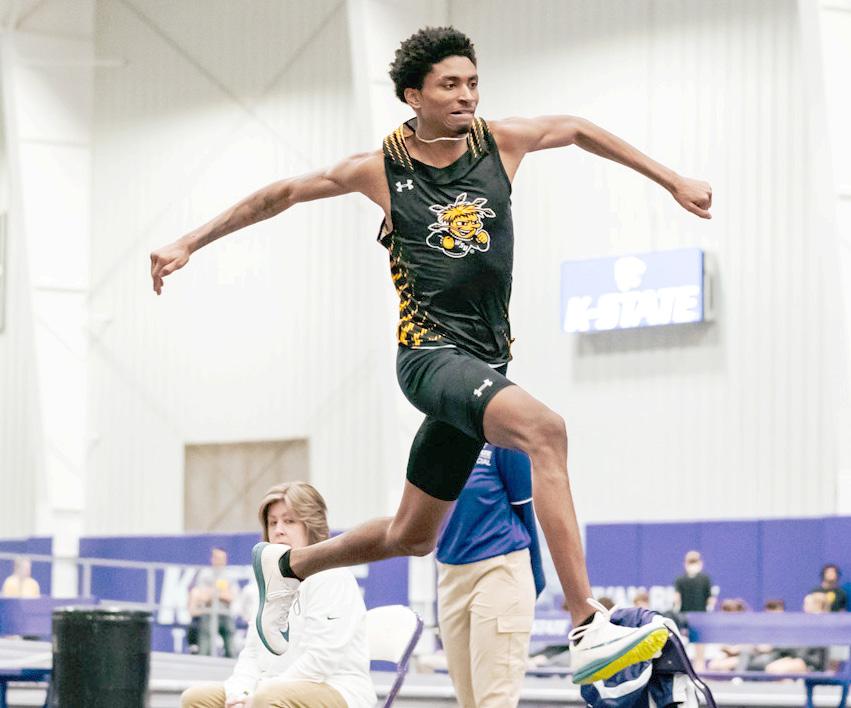
works of Eminem, Tupac and even Michael Jackson.
Williams said his beats help him reflect on how he feels emotionally.
“Like if you’re upset, you can go at … a high-intensity beat,” he said. “If you’re sad, you can go … almost a Polo G-type-beat with some guitar in it.”
While there is no clear, direct correlation between his musical and athletic background, Williams enjoys listening to music both before and after meets.
He said it helps get the energy flowing and as a result, he’ll “probably jump better.”
Nooner said the team struggled to make simple layups, problems they had in the 66-62 loss against Tulane in January.
“We had two-on-ones and just had a bunch of situations where we just couldn’t finish,” Nooner said.
Tulane’s senior forward Sherese Pittman torched Wichita State, scoring 17 points on 40% (6-15) shooting.
Junior guard Princess Anderson scored 25 points, a new Division I career-high, on 33% (8-24) shooting. Her last five points came when there was less than a minute in the game, however. This was Anderson’s third game eclipsing 20 points in her last four outings. Nooner said the performance epitomizes who Anderson is as a player.
“She’s (Anderson) a natural scorer,” Nooner said. “We just got to work on her efficiency.”
Junior forward Jayla Murray scored just five points and fouled out after 27 minutes of playing time. Her most recent two outings are the first two-game stretch of the season where Murray failed to eclipse double-digit scoring.
Wichita State led at the conclusion of the first quarter, but began a scoring drought of more than seven minutes which accumulated during most of the second period.
During that time, Tulane went on a 12-0 run and took the lead, 23-19. At the 4:42 mark of the second quarter, the Shockers made their first basket and didn’t score again until three seconds were left. The Green Wave ended the half on a 13-3 run and went into the break leading by 11 points, 36-25.
Tulane upped its cushion to 14 points early in the third quarter. After a run from WSU, Tulane responded with another 7-0 stretch and went into the final period with a 13-point lead.
The Green Wave managed to increase the lead to 17 points — the largest of the game — midway through the fourth quarter.
Wichita State cut the lead to five with 17 seconds left.
Nooner credited the team’s effort and hustle throughout the second half, especially in the fourth quarter.
Teammates like Carson Ratzlaff and Kaleb Tesmer wouldn’t freestyle at first, but with some convincing from Williams, now they do.
(freestyling) was just kind of a way to make things not awkward.”
Ratzlaff said it has been a good way for the two to break the ice together since they met after committing to Wichita State.
“When you just meet someone new, it’s kind of awkward … at first,” Ratzlaff said. “But it
Williams compared his music to early Kanye West, particularly the “The College Dropout” album, and Polo G, incorporating riffs from the guitar and piano where they best fit. Williams also draws from the
Depending on how well a meet goes, Williams puts on what he calls “white girl music,” songs you can jump around to.
Williams hinted at releasing a track or an album one day despite not currently releasing music officially.
“Maybe (I’ll) tell you the release date,” he said while laughing.
“We ramped up our defense and kind of forced them (Tulane) into quick shots,” Nooner said. “And we outrebounded a lot better and we were able to get out in transition and score before they (could) get their defense set.” Next up, Wichita State will return to Wichita on Saturday, March 1. The tipoff is set for 2 p.m. against the University of North Carolina at Charlotte.
ARTS & CULTURE
SPRING AWAKENING

Wichita State rendition of ‘Spring Awakening’ navigates teenage realities of looming adulthood

Riley Sipes
“Spring Awakening,” a musical written by Steven Sater with music by Duncan Sheik, follows the lives of a group of adolescent students during the late 1800s in Germany as they navigate their budding sexualities and come to terms with the realities of adulthood.
My introduction to “Spring Awakening” was a poorly filmed performance of the original Broadway cast, starring Jonathan Groff and Lea Michele. I came across it scrolling the depths of YouTube when I was not much older than the characters themselves.
Not only did I immediately become obsessed with the soundtrack, I fell in love with the witty characters, finding their innocence relatable.
Wichita State’s School of Performing Arts put on “Spring Awakening” from Feb. 20-22, piquing my interest almost
immediately. I appreciate that the director, Jacob McGlaun, decided to bring the joys and tribulations of teenage angst to Wichita State’s student body.
Overall, McGlaun’s rendition of the coming-of-age rock musical was reasonably entertaining. It adhered to the original Broadway production fairly closely, not taking many outlandish creative liberties.
However, McGlaun did make some questionable casting decisions that, I think, led the mood of the show to feel sloppier than I’d expect for a college-level production.
Solomon Puckett made his Wichita State performing debut starring as Melchior Gabor, an intelligent yet perverse schoolboy.
I was optimistic during the beginning of his first song “All That’s Known,” impressed with the quality of his tone. However, Puckett’s performance quickly fell flat when the music faded and dialogue ensued.
What was confusing to me was how haphazard much of his performance was. While Puckett
is undeniably vocally talented, his acting between numbers could have easily been improved upon by providing more interesting facial expressions and body language.
There are multiple scenes where Gabor is sitting by a stream monologuing about his extremely pensive thoughts on society.
I wasn’t impressed with Puckett’s unchanging face throughout these monologues. It didn’t feel like he was acting; it simply felt like he was reading out loud.
There were a couple of outstanding scenes, though, that I felt truly encapsulated Puckett’s acting potential.
There is a moment toward the end of the performance where Gabor discovers Wendla Bergmann has died. Gabor falls to his knees, sobbing over her fresh grave.
Puckett’s portrayal of this scene was gut-wrenching and I think is further evidence that he could have put that much energy into the rest of his performance.
Hayley Loya played Bergmann, Gabor’s naive and melodramatic
love interest. The reality of Bergmann’s innocence is that it makes her slightly obnoxious at times, but Loya’s strong vocal performance brought a deeper tone to Bergmann’s usually meek character, which I was not expecting to enjoy as much as I did.
Once again though, the decision to cast someone with a dark and rich vocal tone didn’t quite match the vibe of Bergmann. Despite this, I enjoyed Loya’s performance.
Admittedly the standout acting performances in this production did not come from the two lovebirds, but rather the supporting actors.
Jack Wilson’s depiction of Moritz Stiefel, Gabor’s highstrung best friend, was beautifully heartbreaking, and Zoe Phillips’ wonderful portrayal of Ilse Neumann, Bergmann’s freespirited classmate, came as a pleasant surprise as her character stayed in the background for much of the first act, only stepping into the spotlight in the second.
Even though McGlaun was
not spot on with casting this production, I think he got away with those decisions thanks to the alt-rock and folks-y influences of the score. The vocal performance doesn’t have to be perfect.
“Spring Awakening” exposes almost every part of a teenager’s overly hormonal psyche, both the bad and the good.
It addresses sexual assault, abuse and suicide, but it also takes the emotions and actions of these repressed students very seriously, refusing to dwindle their feelings down to the immature thoughts of children who don’t know how the world works.
“Spring Awakening” was the perfect choice for the School of Performing Arts to put on because its message is a universal truth, fresh in the minds of Wichita State students.
While I believe McGlaun made a risky decision casting two individuals with very little professional theater experience as the leads, it ties in the innocent and transformational spirit of “Spring Awakening” masterfully.
Former oboe professor contemplates occupation switch after career-ending injury
BY MALEAH EVANS
arts@thesunflower.com
Andréa Banke performed as the principal oboe with the Wichita Symphony Orchestra and worked as a professor of oboe at Wichita State University, until 2019 when she had an accident and suffered a career ending injury.
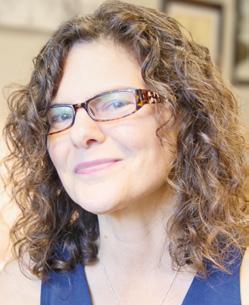
A mild stroke left her with nerve damage to the left side of her face, leading Banke to take on the position of program director of the Master of Arts in Arts Leadership and Management degree, a role that still allows her to interact with students without actually playing the oboe.
“I learned both adaptability and resilience — these are the two biggest factors in being successful in any field but especially music and leadership,” Banke said. “It was pretty messy; I had to embrace my grief and keep working daily on the little things that I could do at first.
“When we have these sort of catastrophic life changes, nobody’s prepared for them, especially sort of at the height of their career,” Banke said. “My accident resulted in some nerve damage, which made it impossible (to play). I lost
some left channel hearing, and perhaps more importantly the ability of some of my nerves to function on the left side of my face, such that I could not, certainly at a professional level, play oboe anymore.”
Banke made several trips to neurologists and the Mayo Clinic to try to see what could be done about her injury, but the adjustment to her new life was difficult.
“It was life without the oboe, life without performing, life without me being an artist on the stage,” Banke said. “It’s a shock to the system. I had to trust my mind to carry on when my body really wanted to quit.”
Banke said that, like many professional artists, the oboe was inseparable from her identity.
CHANGING DIRECTIONS
Banke said that she is so grateful and thankful to the School of Music and College of Fine Arts on campus, that they gave her a new opportunity.
“They told me by their actions, that my diminished capacity as an oboist did not mean diminished value to the College of Fine Arts or to students,” Banke said. “They showed me that they were willing to navigate the really difficult path forward with me.”
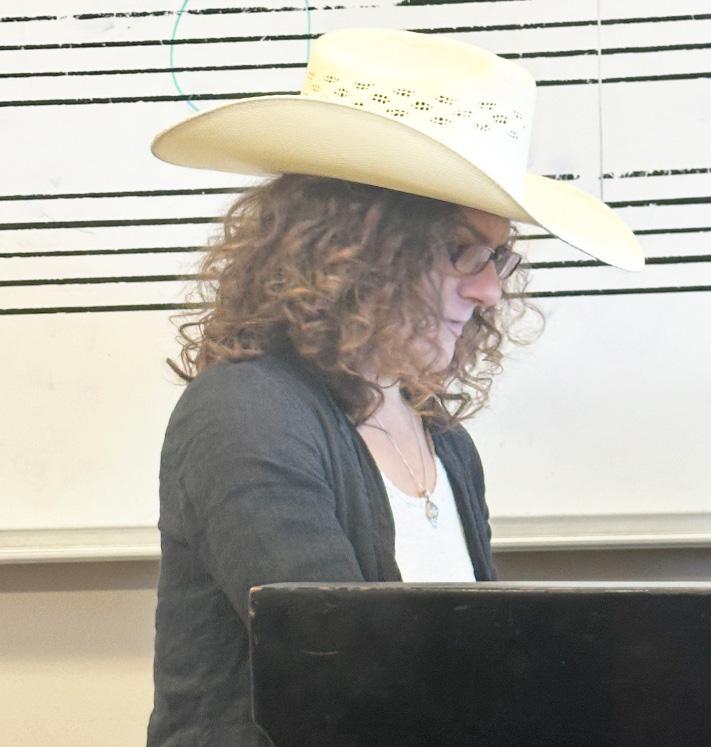
In her new position, Banke feels as though she’s able to empower her students more effectively and that she’s developed more patience and empathy.
“I think I’m able to train better artists and entrepreneurs after my accident,” Banke said.
Max Truong, a senior who worked closely with Banke for graduate school applications, said that class with Banke was transformative.
As a transfer student from Vietnam, Truong said that Banke would take the time to explain pop culture references to him.
“It makes me feel really seen and heard as an international (student), coming into a new country, getting used to the environment,” Truong said.
Truong reflected on how
supportive Banke is.
“She really has a way to connect with students individually,” Truong said. “It’s so beautiful to see that a college professor is putting that much time and effort into the growth of individual students.”
Enrich Patdu, a sophomore studying vocal music education, took three classes with Banke and said that she was one of the most understanding professors.
“She isn’t lenient, but she does give opportunities for help if you ask,” Patdu said. “She was really easy to work with and like one of the sweetest people I know.”
Throughout the classes, Patdu said that she felt like Banke understood her both as a student and a person.
“She supported me through the whole way, and even would like take me aside and be like, ‘I’m really proud of what you’ve done,’” Patdu said.
Bailey Jensen, a sophomore studying music education, took a class with Banke, and she said she understands teaching in general.
“Love that woman, I miss her (class) everyday,” Jensen said. “She has so much office hour availability; she wants to help every single person she can. She reaches out to people who don’t participate much in class and asks them how they’re doing.” When the School of Music
made catalog changes and several students missed out on a required class, Jensen said that Banke reorganized her curriculum to help those students.
“She went back and re-taught all of that material just to make sure that they would have that understanding,” Jensen said. “She changed her lesson plans and curriculum for several weeks to be able to actually make sure they understood.”
Banke said that this is something that she has always practiced, meeting students where they are.
“It’s not ‘missed material’ or ‘failure’ at all; we start where you are,” Banke said. “It’s revisiting content in a new year, reflecting and reevaluating, and then chatting about how we can best get it to stick this time. For me, this involves curiosity, play, humor, evaluation and peer assessment.” To Banke, a career change does not mean the same thing as career death.
“If we lament over the limitations, we really don’t focus on what we can do now and set those new goals,” Banke said. “When we allow ourselves to be vulnerable and pivot and explore the possibility that our lives can and will change, I think we become more creative and better leaders.”

by Wren Johnson / The Sunflower
WSU needs to rethink plans for Heskett demolition

While Wichita State’s Heskett Center could use a few upgrades to better serve the athletic students around campus, tearing it down completely disregards its value and function for students.
WSU’s master plan includes demolishing the Heskett Center to make room for an indoor track facility, outdoor tennis courts and grass playing fields. WSU’s 2024 master plan update outlines a vision for the next decade, aiming to expand its facilities and align with goals like studentcenteredness, research and community engagement.
The plan consists of many demolitions, renovations and rerouting of businesses and roads.
The changes are supposed to support WSU in bridging “between academics and industry” by updating old buildings and introducing new opportunities.
A significant part of this vision involves demolishing a plethora of buildings, including the Heskett Center. While the Heskett Center could benefit from — and very much needs — an update, demolishing and relocating it entirely is unnecessary.
WSU claims these changes aim to increase recreation space within the main campus, but the plans feel excessive and shortsighted. A thoughtful renovation would address any issues while maintaining continuity for students and preserving the facility’s current role on campus.
Take, for instance, Clinton Hall — the former home of the Barton School of Business — being completely redone. Now, it has a new purpose: the Shocker Success Center. There was not a complete demolition and the building continues to serve a purpose on campus.
But the Heskett Center is not the only athletic facility at WSU, and relocating it will not consolidate campus athletics. If the goal is expansion, why not add new structures on available or underutilized land? The land at the intersection already holds potential for expansion.
The push for demolition and rebuilding appears more like a trend than a necessity, and it raises questions about the sustainability and financial prudence of such decisions. Instead of pouring resources into demolition, the university should focus on improving and enhancing existing spaces. WSU could demonstrate its commitment to sustainability and fiscal responsibility by renovating the Heskett Center and expanding the athletic facilities elsewhere.
The money dedicated to the demolition and new build of the Heskett Center should be moved toward a new dorm project. Returning students will be further limited to The Flats, which is saved for scholarship students. It is a battle to try and live on campus — a battle the university continues to fuel. But ultimately, the university chooses to dedicate its time and money to wasting resources and tearing down school history.
Sometimes, progress doesn’t require starting from scratch — it just needs a little creativity and patience.

Trump’s war on the press should alarm Americans

The free press is — once again — under attack in the United States, and every American should be paying attention.
President Donald Trump has barred the Associated Press (AP) from White House press events, Air Force One and even the Oval Office — not because of security concerns or journalistic misconduct, but because AP refused to adopt his administration’s naming preference for the Gulf of Mexico.
The Trump administration also announced plans to select which journalists can participate in the presidential press pool, a move that breaks decades of precedent and goes against press freedoms.
This is not just another Trump
controversy. This is an attempt to control the media and, by extension, the information that reaches the American public.
The situation began with Trump’s executive order renaming the Gulf of Mexico the “Gulf of America.” AP, a global news organization committed to factual and nonpartisan reporting, refused to comply with this blatant attempt at rewriting geographic reality.
In response, the White House has systematically restricted AP reporters from press briefings and events, a direct retaliation for the AP’s editorial independence.
This isn’t solely about the name change. It is about control.
Trump’s actions signal a dangerous precedent: If a news organization refuses to parrot the administration’s preferred narrative, it will be punished.
This is not how democracy functions. The free press exists to
hold those in power accountable, not to serve as an extension of the president’s propaganda machine.
Trump’s rhetoric has long been hostile toward the media.
From calling journalists “enemy of the people” to encouraging violence toward reporters, he has sought to delegitimize any outlet that makes content he doesn’t like. Freedom of speech is only valued if it supports him. Now he is taking it a step further by using his power to enforce obedience from the press.
This should concern every American, regardless of political affiliation. The moment a president can dictate what the media reports and how it reports it, democracy is in danger.
The United States was founded on the principle that a free press is essential to an informed public. The First Amendment guarantees that no government official — especially
not the president — can dictate what the press says or how it operates.
By barring the AP and limiting the access of other members of the press, the White House has not only targeted one of the world’s most respected and reliable news organizations, but it has also sent a chilling message to others: Fall in line or lose access. If Trump succeeds in silencing the AP, what’s going to stop him from going after other national outlets or our local newspapers and The Sunflower?
Americans must not ignore this. The press is not the enemy — the press is a safeguard. When the government fears scrutiny, it is the public’s duty to lash back. Allowing Trump to handpick his reporters lets him filter, control and handpick content. Trump is not just attacking the AP; he is attacking the truth and our freedom.
Wichita State makes rocky debut on Amazon Prime’s ‘The College Tour’
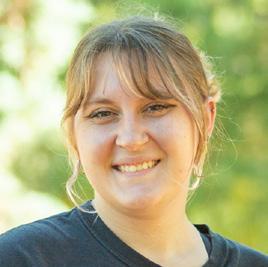
Miller opinion@thesunflower.com OPINION
Wichita State University recently received its own episode on the Amazon Prime show, “The College Tour,” where its debut was, frankly, mediocre.
“The College Tour” is a show hosted by Alex Boylan who walks the viewer through a different college in each episode.
These tours include information on majors, housing, internship opportunities and events.
The episode even features student interviews and tours through buildings to show off parts of campus.
I walked into my viewing with a slightly cynical view, mostly due to the price tag that has followed this decision.
Wichita State spent $188,000 in order to be featured, which as many would agree, would have been better spent on making the college better for the students and faculty that are currently attending.
The episode, which premiered on Jan. 24, reeks of artificial, promotional college content. It includes clearly staged walking clips, slightly awkward laughing scenes and moments in classes that have clearly been set up.
EPISODE HIGHLIGHTS
Engineering student Dimitri Seneviratne created a working Iron Man gauntlet. It was the coolest part of the entire episode.
All the clips from the aviation building were super awesome to see.
I’m possibly biased as a digital media student myself, but the clips and interview with film student Luke Parrett were so interesting. In the background, you can see people setting up for a scene.
But I was pleasantly surprised by the amount of diversity that was presented in the episode.
Wichita State is mostly known for its engineering and business majors, as well as the internship opportunities housed right on campus.
Due to this being the university’s pride and joy, I was expecting it to take up the majority of the run time throughout the episode.
While the topic was brought up and thoroughly presented, all different types of majors, buildings and students were given the floor, too.
“The College Tour” not only showed off the main campus but also took the time to show and interview students that are a part of the Innovation Campus, WSU Tech and Shocker Studios.
All of these buildings are often overshadowed by the typical engineering and business developments on campus, especially in promotional content, so it was satisfying to see the buildings and students get the recognition they deserve.
Two international students: Tavonga Mwenje, who is an aviation major from Zimbabwe, and Yumi Kikuchi, who is an innovation and design major from Paraguay, were interviewed.
Their interviews were extremely interesting, especially when they described why they chose Wichita State. Other students who were spoken to were from a wide range of places. Some were from Wichita, while others were from Oklahoma and Texas.
As a student, I do not think the episode is awful, but I would be lying if I told you that it felt realistic in any sense of the word. I agreed with a lot of the points.
Wichita State does have great internship opportunities, it’s nice to have a YMCA membership, and I have had great experiences with students and teachers. These are just a few perks
While I agree there is a good amount of dorm selection on campus, as someone who actively lives on campus, it was completely overhyped. Some of the staged scenes are almost sickeningly obvious, which really takes me out of the episode.
As someone who also is constantly fighting with ScholarshipUniverse, I would not say Wichita State makes getting scholarships “quick and easy.”
The history lesson at the end of the video felt extremely shallow and was honestly just super boring.
mentioned in the episode. But it glosses over the difficult fight for scholarships, expensive tuition and the consistent issues that stem from the money-driven choices the college continues to make.
The college should be focused on making the school better and elevating the current student experience rather than appealing to Amazon Prime viewers who won’t invest in the university.
SPRING HAS SPRUNG
‘Spring Awakening’ navigates realities of adulthood and sexuality
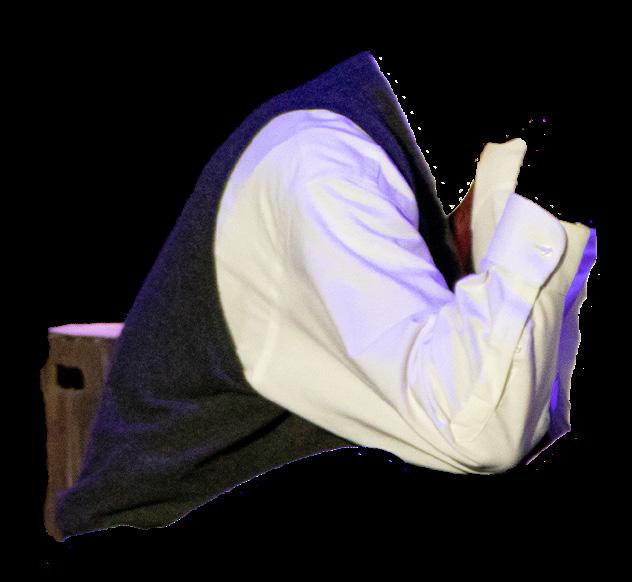


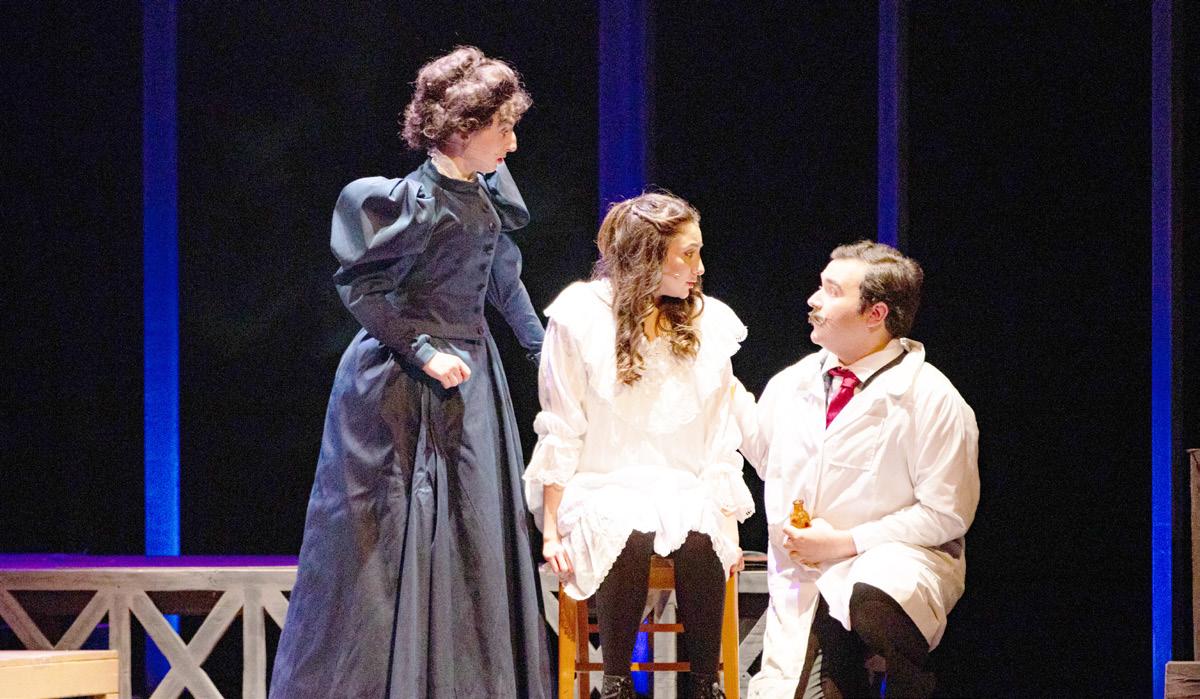
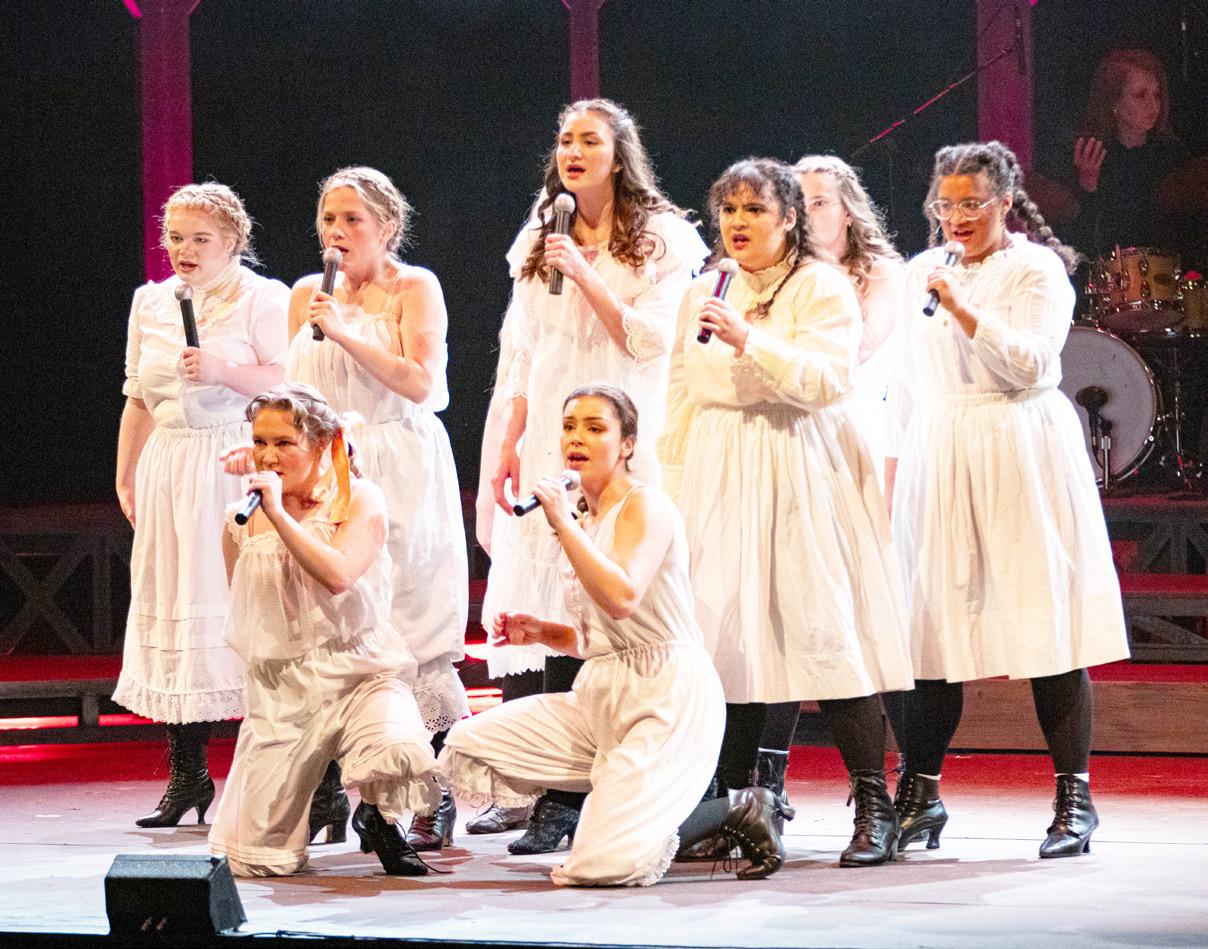
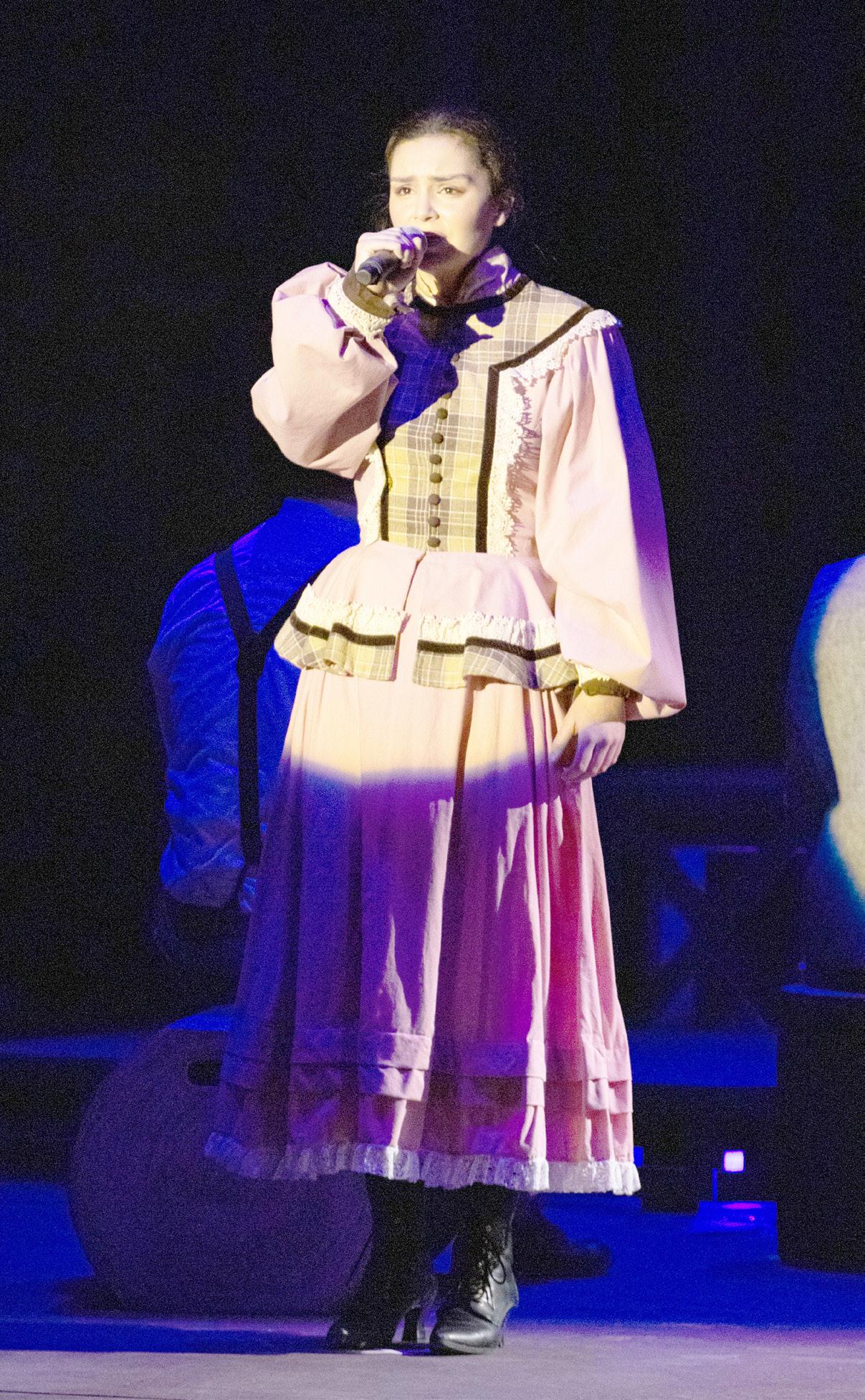
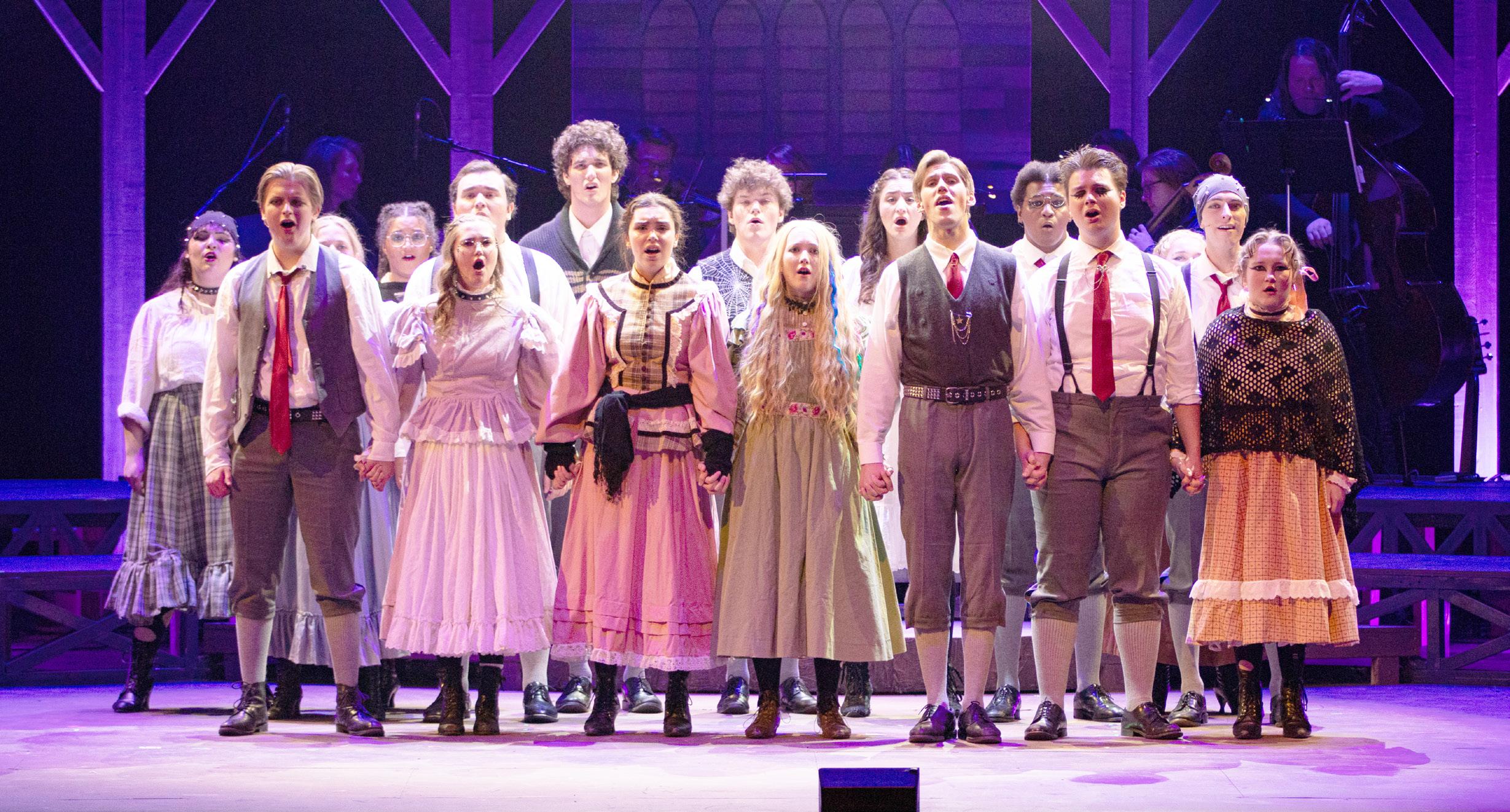
UPCOMING EVENTS
FACULTY ARTIST
SERIES FEATURING
PHIL BLACK, TUBA
SUNDAY, MARCH 2
3 p.m.
Wiedemann Hall
Join assistant professor of tuba Phil Black in this “memorable showcase of vituosity and musicality.” With an abundance of experience across the nation, Black serves as principal tubist with the Wichita Symphony Orchestra and Wichita Brass Quintet. Students can get a free ticket in advance at the Fine Arts Box Office in Duerkson Fine Arts Center, by phone at (316) 978-3233 or online at wichita.edu/fineartsboxoffice. Sales at the box office are suspended three hours before the concert and open up again one hour before the event. Tickets are $5 otherwise.
MADRIGAL INVITATIONAL MONDAY, MARCH 3 & TUESDAY, MARCH 4
7:30 p.m.
Wiedemann Hall
High school choral groups across Kansas will join together for these performances. Students can get a free ticket in advance at the Fine Arts Box Office in Duerkson Fine Arts Center, by phone at (316)9783233 or online at wichita.edu/ fineartsboxoffice. Sales at the box office are suspended three hours before the concert and open up again one hour before the event. Tickets are $5 otherwise.
SUMMER AND FALL 2025
SCHEDULE OF COURSES AVAILABLE ONLINE
MONDAY, MARCH 3
CRIMINAL JUSTICE CAREER FAIR
TUESDAY, MARCH 4
10 a.m. - noon
Rhatigan Student Center, third floor
This fair offers candidates interested in criminal justice careers like law enforcement, corrections, legal services and forensic science to connect with employeers. Students are not required to register to attend the fair.
SAVVY SCHOLAR WORKSHOP: AI AND LIBRARY RESEARCH: THE GOOD, THE BAD, AND THE UGLY
TUESDAY, MARCH 4 3 - 4 p.m.
Ablah Library or online Learn how to effectively utilize AI to speed up your research while acknowledging its limitations. Learn more at libraries.wichita.edu/ savvyscholar.
RUBE GOLDBERG COMPETITION
TUESDAY, MARCH 4
6 p.m.
John Bardo Center, room 264
Join the American Society of Mechanical Engineers for their second general meeting of the semester. Compete to build the best Rube Goldberg machine and win a prize. Food and drinks will be provided.
GUEST ARTIST KORY REEDER, COMPOSER
WEDNESDAY, MARCH 5
7:30 p.m.
John Bardo Center, room 264
Kory Reeder’s music explores minimalism and deep, active listening. Students can get a free ticket in advance at the Fine Arts Box Office in Duerkson Fine Arts Center, by phone at (316) 9783233 or online at wichita.edu/ fineartsboxoffice. Sales at the box office are suspended three hours before the concert and open up again one hour before the event. Tickets are $5 otherwise.
HAVE AN EVENT YOU WOULD LIKE LISTED?
CONTACT THE ARTS EDITOR: arts@thesunflower.com
CONTACT THE NEWS EDITOR: news@thesunflower.com
